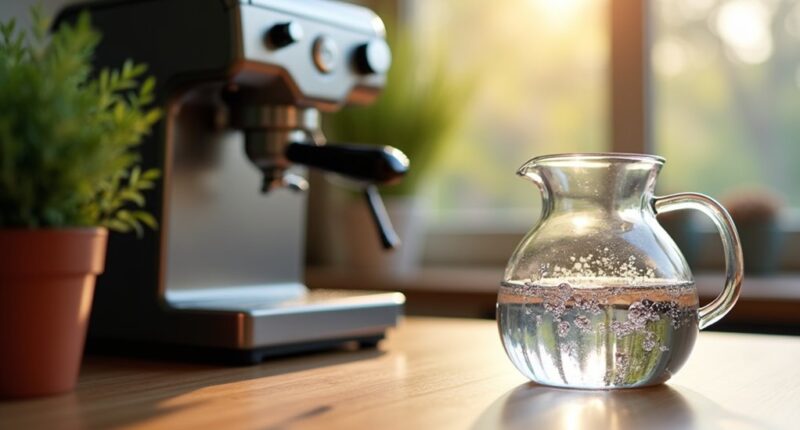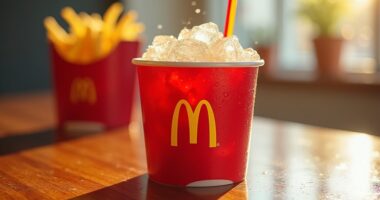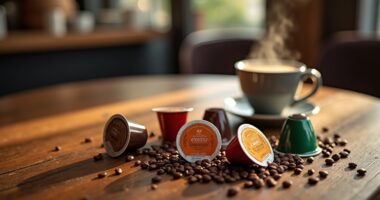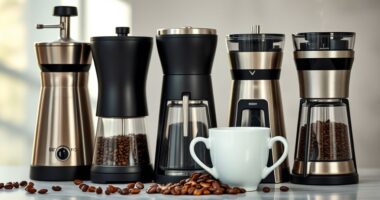If you wanna brew an awesome cup of coffee, starting with the right water is key! Filtered water’s a solid choice, kicking out the weird flavors and keeping your machine in shape. Spring water adds those tasty minerals that really boost the flavor! Just avoid distilled water alone; it can taste pretty flat. And mixing filtered and tap water helps balance things out. Stick around and you’ll learn how to make the most of your coffee magic!
At a Glance
- Use filtered water to remove chlorine and impurities, enhancing coffee flavor and machine longevity.
- Spring water is ideal as it contains natural minerals that improve taste without causing scale buildup.
- Avoid distilled water for regular brewing, as it lacks minerals and can result in flat-tasting coffee.
- Regularly clean and replace filters to maintain water quality and prevent scale accumulation in the machine.
- For optimal extraction, blend filtered water with tap water to achieve ideal total dissolved solids (TDS) levels.
Importance of Water Quality in Coffee Machines
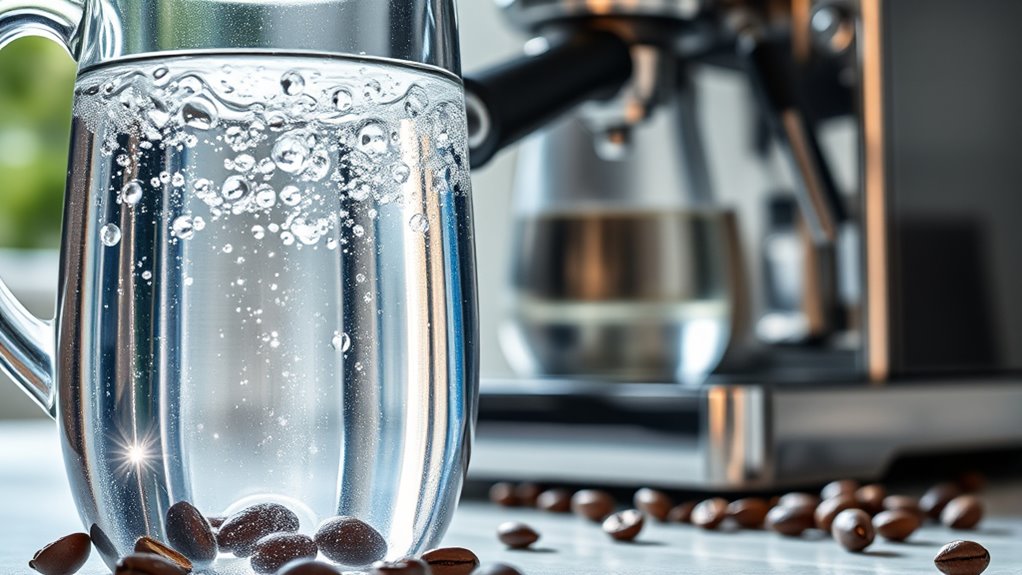
When you think about brewing a great cup of coffee, you might focus on the beans or the machine, but don’t forget about the water!
Your water source plays a huge role in taste enhancement. Using clean, filtered water means you’re cutting out the weird flavors that can sneak in and ruin your brew. Plus, you’ll keep your coffee machine happy, reducing scale buildup. Trust me, nobody wants to deal with a cranky coffee maker! Additionally, using bottled or spring water will not only improve flavor but also promote optimal machine health.
Types of Water Recommended for Coffee Machines
Let’s plunge into the different types of water you can use for your coffee machine, because trust me, it matters! Choosing the right water sources can totally affect your brew’s taste. Here’s a quick guide to help you balance those minerals:
| Water Type | Benefits |
|---|---|
| Filtered Water | Cleans out chlorine and impurities |
| Distilled Water | No minerals, prevents scale but may taste flat |
| Spring Water | Natural minerals, can boost flavor |
| Mineralized Water | Adds minerals for better taste |
| Water Blends | Custom mixes for perfect extraction |
Mix and match to find your favorite! Remember, proper coffee storage can also enhance the overall quality of your brew. Happy brewing!
Water Hardness and Its Effects
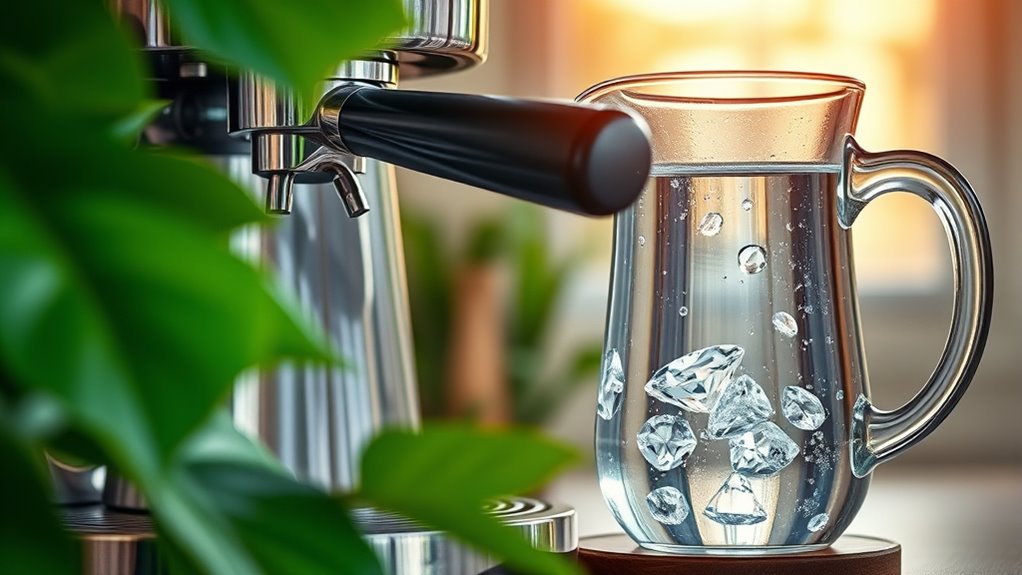
You mightn’t think about it, but the hardness of your water can really mess with your coffee game.
Hard water, packed with calcium and magnesium, can lead to scale buildup, which means your machine’s heating elements can get gunked up. Not cool, right?
Hard water loaded with calcium and magnesium can clog your machine, ruining both efficiency and flavor.
This not only affects the brewing efficiency but can also throw off the flavor of your coffee.
By focusing on scale prevention and achieving that perfect mineral balance, you can keep your machine running smoothly and your coffee tasting amazing. Additionally, using BPA-free coffee makers can help ensure that your coffee maintains its true flavor without any unwanted chemicals leaching into your brew.
Filtering and Treatment Technologies
While it might seem like water is just water, there’s a whole world of filtering and treatment technologies that can make a huge difference in your coffee experience.
For instance, ion exchange systems soften your water by swapping out those pesky hardness minerals with sodium. Think of it as giving your water a spa day!
Then, there are deionization methods that remove almost all dissolved solids, so your coffee machine stays happy and scale-free. These technologies keep your brew tasting fantastic and your machine running smoothly. Additionally, using filtered water can enhance the rich flavors of ground coffee, ensuring a more enjoyable cup.
Best Practices for Water Use in Coffee Machines
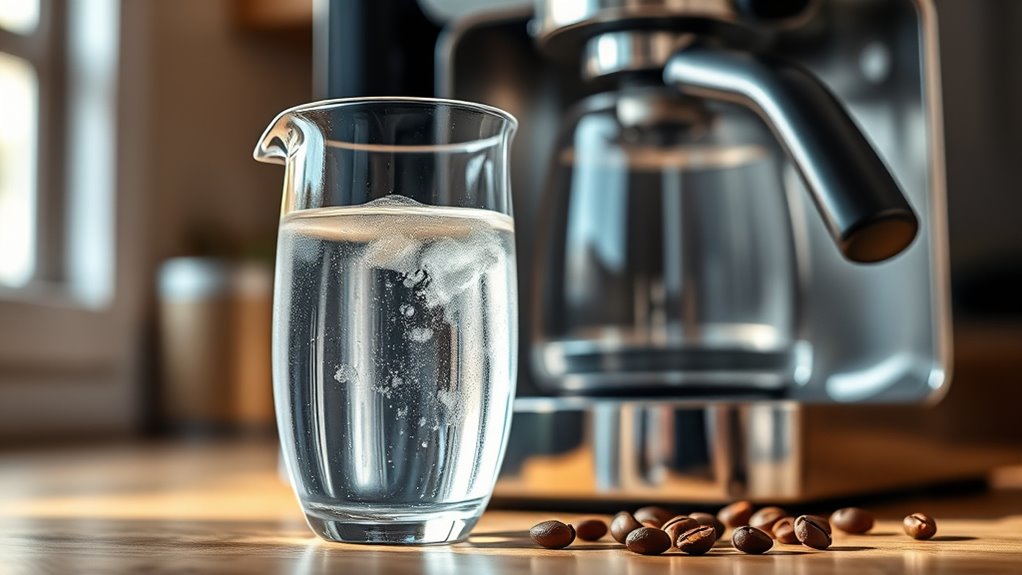
When it comes to brewing that perfect cup of coffee, using the right water is just as important as picking the right beans.
For the best flavor enhancement, regularly replace or clean your water filters—trust me, your coffee will thank you!
Regularly replacing or cleaning your water filters is essential—your coffee will taste the difference!
If you live in a hard water area, try blending filtered water with a bit of tap water for that sweet spot of 40-60 ppm total dissolved solids.
And don’t forget about temperature! Keeping your brew between 195°–205°F is key, as brewing coffee at the perfect water temperature helps to extract the best flavors.
Finally, use thermal carafes to avoid overcooking—nobody wants burnt coffee.
Cheers to great brews!
Recommended Coffee Machines for Various Water Types
Finding the right coffee machine for your water type can feel like a treasure hunt, but it’s totally worth it for that perfect cup of joe!
If you’ve got hard water, check out brands like Hamilton Beach or Ninja—they’ve got built-in filters to tackle those pesky minerals.
For filtered water lovers, Bonavita is your buddy, brewing at just the right temp!
And if you wanna go fancy, JURA machines offer exceptional filtration.
Just remember, water quality considerations are key—balance is everything for a smooth brew. Additionally, using a machine like the JURA E4, with its professional aroma grinder, can enhance the flavor profile of your coffee, making it even more enjoyable regardless of your water type.
The Role of Temperature in Brewing
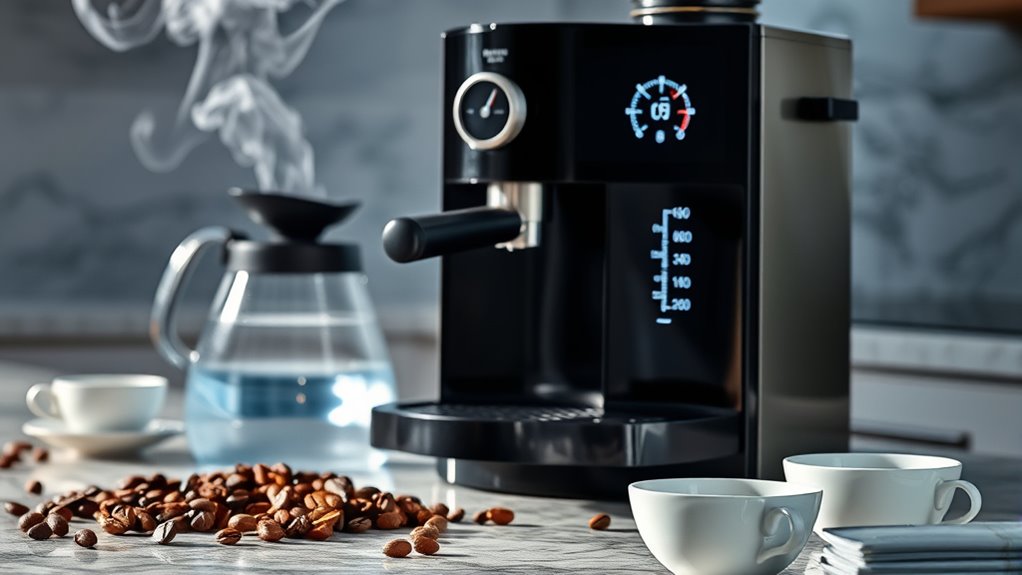
You’ve got your coffee machine, you’ve picked the right water, and now it’s time to talk temperature—the magic number is between 195°F and 205°F!
This range is key for ideal extraction efficiency. If it’s too hot, you might over-extract and end up with bitter coffee; too cool, and you’ll miss out on those delicious flavors. Additionally, using low acid coffee can enhance your experience, as it provides smoother flavors that are less harsh on the stomach.
Balancing brewing variables like water temperature guarantees you get that perfect cup every time. Think of it as the secret handshake among coffee lovers—nailing the right temp means you’re officially in the club!
Understanding Total Dissolved Solids (TDS)
Total Dissolved Solids, or TDS, might sound like some boring science term, but trust me, it’s a big deal when it comes to your coffee game!
TDS measurement tells you how many minerals and compounds are floating around in your water. You want the right balance—too high, and your coffee can taste bitter, too low, and it might be flat.
This TDS impact affects everything from flavor to your machine’s health. So, whether you’re brewing a cup for yourself or impressing friends, keep an eye on those TDS levels.
In fact, the right mineral content in your water can significantly enhance the extraction process, leading to a more flavorful espresso.
After all, great coffee starts with great water!
Customizing Water Blends for Optimal Flavor
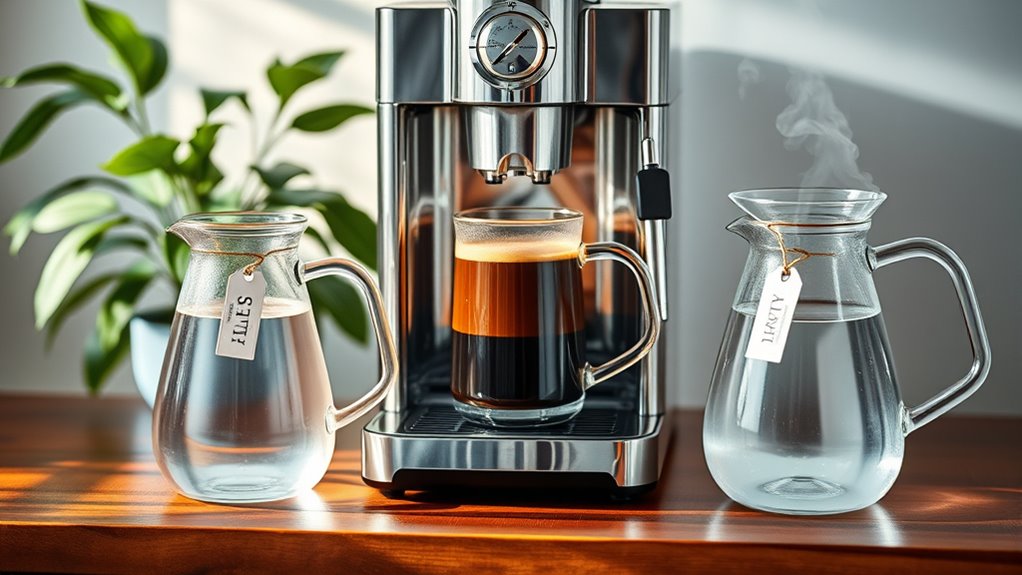
When you start mixing your own water blends, it’s like becoming a coffee alchemist—turning plain water into liquid gold!
Transform your water into a brew masterpiece—mix and create your own unique flavor blends!
Finding that perfect flavor balance is key to revealing delicious brews. Here’s how you can get started:
- Experiment with different mineral contents.
- Aim for a TDS of 40-60 ppm.
- Get to know your water composition.
- Many coffee enthusiasts believe that using filtered water can significantly enhance the taste of your brews.
